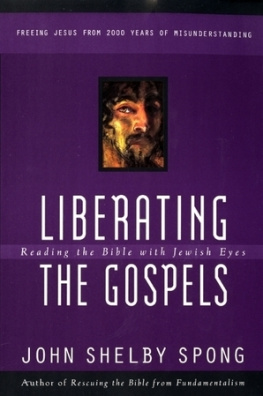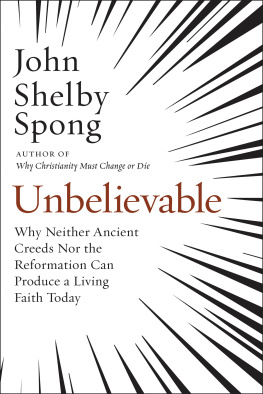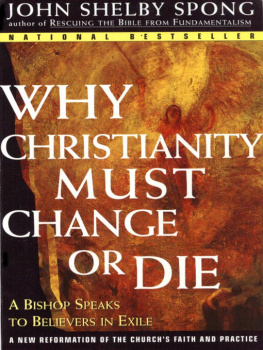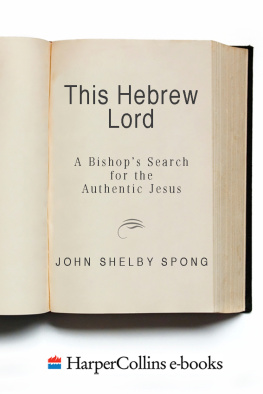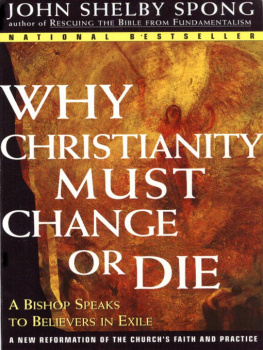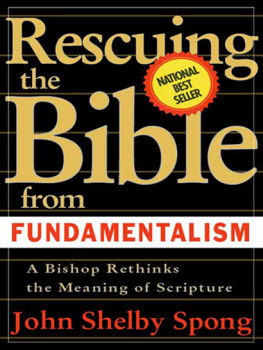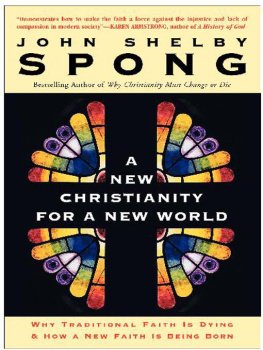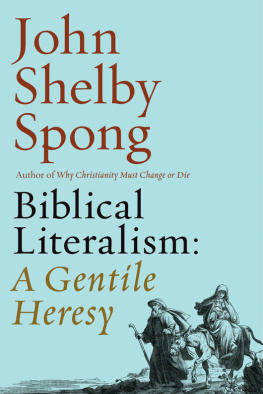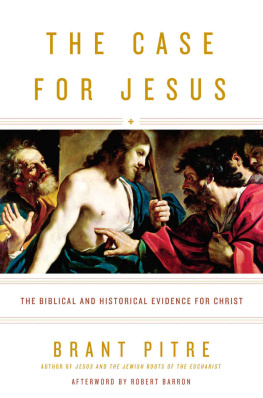T his book was born as early as January 1991, when I was on sabbatical at Magdalen College, Oxford. At that moment I was working on the birth narratives of the New Testament and their implications for contemporary women. In discussing these matters with the Dean of Magdalen College, a New Testament scholar named Jeffrey John, he suggested that I might want to explore the concept of midrash , Haggadic midrash to be specific, that was present in the birth narratives. He also directed me toward the writings of Michael D. Goulder of the faculty of the University of Birmingham in the United Kingdom, about whom I had never heard. It was this suggestion that was to determine the immediate future of both my academic and my writing careers. To my regret I discovered first that most of Goulder's books were out of print. I was able to purchase his most recent work, a two-volume commentary on Luke, entitled Luke: A New Paradigm . My first impression was that it was the most expensive book I had ever purchased! It was also heavy reading. It would be two years before I would do a thorough study of this work. Jeffrey John's suggestion and some of Michael Goulder's insights had their effect on me, however, and this was clearly visible when I published my book Born of a Woman in September 1992. The concept of midrash had become the lens through which I viewed the birth narratives.
Next I moved on to begin some new work on the resurrection narratives, and more and more I was enabled by Goulder and others to see these central passages of the Gospels through Jewish eyes. In the spring term of 1992, while a fellow at Emmanuel College, Cambridge, I wrote Resurrection: Myth or Reality ? In this book I proposed that the Jerusalem Easter tradition was shaped in almost every detail by the Jewish festival of Sukkot or Tabernacles. I had made, almost unconsciously, my first major interpretive connection between Jewish liturgical practice and the shape of the Christian faith. I was, however, not yet aware of how important that connection would turn out to be.
During that same time, I also found in the Cambridge library a copy of one of Goulder's out-of-print books, Midrash and Lection in Matthew . I read it in its entirety. It was, quite frankly, the most exciting New Testament scholarship reading I had done in my professional life. Goulder documented for me the midrashic connections between the Gospels and the Jewish scriptures in mind-boggling ways, and he opened my eyes for the first time to the possibility that the Jewish liturgical calendar, far more than history or the memory of eyewitnesses, had determined both the shape and much of the content of the Gospels.
So dramatic was this learning experience that I did three things. First, I contacted Michael Goulder, told him of my interest in his work, and asked if I might come to Birmingham to spend some time with him. He was wonderfully receptive, and a genuine friendship began to develop. We have now made four journeys to Birmingham to spend time in dialogue with this brilliant and unusual man.
Second, I employed an English rare-books firm to search for copies of Goulder's out-of-print volumes. They were successful, and now each of his published works is a cherished possession in my personal library. Each of these volumes also bears the marks of a book that I did not just read, but devoured. They are penciled extensively, with underlines and comments, and I have copious notes on each of them in my files.
Third, I became convinced that I wanted to write my next book on the Jewishness of the Gospels, despite the fact that I had a contract for a quite different book with my publisher, HarperCollins. My first working title of this new book was The Gospels as Midrash . My editor at HarperCollins, however, discouraged that title for two reasons: First, midrash is not a familiar word to the general reader, he said, and second, Jewish people use the term midrash in a very strict and limited sense, which was quite different from the way I was using the term. I had seen that reaction in my closest rabbi friend, Jack Daniel Spiro, the first time I used the term in a public lecture that he attended. I do not ever want to be offensive to my fellow pilgrims within the Jewish tradition, so in this book I have used the word midrash only as the modifying adjective, midrashic , both to indicate the broadness of the way I am employing this concept and also to leave the word midrash to its special Jewish understanding.
My contract with HarperCollins was for a book on how one can continue to say the creeds of the Church with integrity while taking seriously the intellectual revolution that stretches from Copernicus through Einstein, and into the fields of astrophysics and subatomic physics, which has created what some call the postmodern world. This book, which was to be called A Believer in Exile , now needed to be postponed. Writing is such an all-consuming vocation that one can hardly afford to focus in more than one direction at a time. My friends at HarperCollins agreed to this plan and allowed me to postpone A Believer in Exile , which is now scheduled for a 1998 publication date.
So it was that my consuming task from 1992 to 1995 was to explore the Jewish background of the Christian scriptures. My primary teacher, through his books as well as in correspondence, and through personal visits, has been Michael Goulder.
This man fascinated me not only with his writing but also with the personal journey of his life. His story was unique. It is fair to say that Michael Goulder is not a power in religious or ecclesiastical circles. Indeed, his work is generally ignored by that world. One reason for this is that his books are not written for popular consumption. They will never be part of the table talk of ordinary folk. They are closely argued, heavily footnoted, and lean quite frequently on the nuance found in a Greek or Hebrew word. They are also challenging to the orthodoxy of the contemporary religious consensus. Since they are not likely, therefore, to come to public attention, the traditional theological defenders of the faith do not have to deal with Goulder's arguments or insights. So a scholar like Goulder does not haunt the religious establishment. He tends rather to remain in the shadows.
There is one other reason, however, that I think is even more telling. Michael Goulder was at one time an ordained priest in the Church of England. Before plunging into graduate studies and an academic career, he had actually served as the vicar of a congregation. However, as broad as Anglican Christianity has tended to be theologically, the way that faith community understood its belief system became less and less adequate for this probing scholar. In 1981, after producing three of his most penetrating books, Michael Goulder resigned from his ordination and ceased to identify himself as a priest. He also ceased even to identify himself as a Christian, proclaiming himself to be a nonaggressive atheist. Christian traditionalists who are more acquainted with the techniques of propaganda than they are with the demands of education find it hard to deal with a brilliant New Testament scholar who is an atheist. The easiest way to handle that situation is simply to ignore it. So Michael Goulder has generally been ignored in the academic circles that purport to be made up of Christian scholars. It is a shame because the insights of truth, even the truth that lies buried beneath the words of the gospel, are valid no matter who the illuminating source of those insights happens to be. Truth, even Christian truth, can and does stem from the mind and pen of one who thinks himself to be an atheist.

